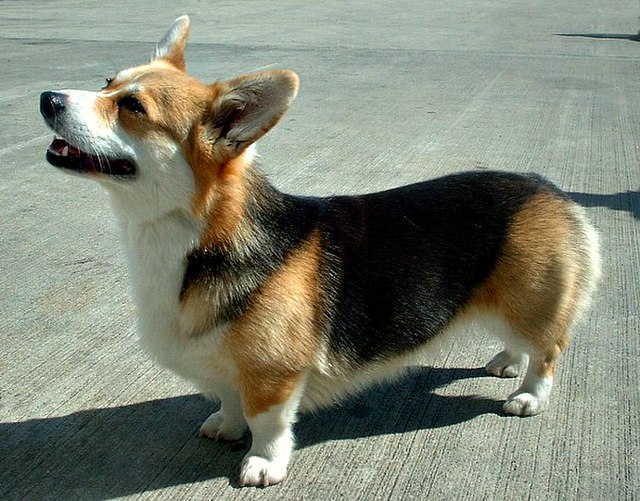


The Pembroke Welsh Corgi is a small, yet sturdy herding dog that is beloved for its cheerful personality and striking appearance. Known for its short legs, long body, and large expressive eyes, the Pembroke Welsh Corgi is one of the most recognizable and charming breeds. They were originally bred to herd cattle, sheep, and horses, and their intelligence, agility, and herding instincts still shine through today. Corgis make excellent family pets due to their friendly and affectionate nature, and their loyalty and playful demeanor make them great companions for active individuals and families alike.
The Pembroke Welsh Corgi has roots that go back over a thousand years, originating in Wales, where it was used primarily as a herding dog. It is believed that Corgis were brought to Wales by Flemish weavers or Vikings, who used them to herd cattle. The breed’s short stature was ideal for nipping at the heels of livestock while remaining agile and quick. Over the centuries, the Pembroke Welsh Corgi evolved to become a skilled working dog and companion, favored for its intelligence and energetic personality. The breed became particularly famous when it was adopted by the British royal family, with Queen Elizabeth II owning Corgis throughout her life, which further boosted their popularity worldwide.
The Pembroke Welsh Corgi is a compact and muscular dog with a distinctive appearance. Adult Corgis typically stand around 10 to 12 inches (25 to 30 cm) tall at the shoulder and weigh between 25 to 30 pounds (11 to 14 kg). One of the breed's most distinctive features is its short, stocky body with a long back. The breed has a double coat: a thick, weather-resistant outer coat and a soft undercoat, which sheds heavily, especially during seasonal changes. The coat comes in a variety of colors, including red, sable, fawn, black, and tan. Pembroke Welsh Corgis often have a naturally short tail or a docked tail. Their ears are upright and triangular, contributing to their alert and keen expression. The Corgi’s eyes are wide, dark, and expressive, giving it a very attentive and engaging look.
Pembroke Welsh Corgis are known for their friendly, affectionate, and intelligent personalities. They are social dogs that thrive on human companionship and enjoy being part of the family. Corgis are typically good with children and other pets, although they can exhibit strong herding instincts, sometimes nipping at heels or trying to herd smaller animals or people. They are highly intelligent and trainable, often eager to please their owners. However, they can be independent and strong-willed, so early training and consistent leadership are important. Despite their small size, Corgis have a big personality, and they are often described as confident, lively, and outgoing. They also have a natural instinct to protect their home and family, which can make them effective watchdogs.
The Pembroke Welsh Corgi is an active and energetic breed that requires regular exercise to stay healthy and happy. Despite their small size, Corgis have a lot of energy and love to engage in activities such as walking, running, and playing. Daily walks, interactive play, and mental stimulation are necessary to keep the breed physically and mentally fit. Corgis excel in dog sports such as agility, obedience, and herding trials due to their intelligence and drive to work. However, because of their tendency to gain weight easily, it’s important to keep an eye on their diet and ensure they get enough exercise to prevent obesity. Regular outdoor play in a securely fenced yard can also help satisfy their exercise needs, but they should not be overexerted due to their short legs.
Training the Pembroke Welsh Corgi is relatively easy because of its intelligence and eagerness to please. However, the breed can sometimes be independent or stubborn, so consistent training methods are important. Positive reinforcement, including treats and praise, works best with Corgis. Early socialization is crucial for Corgis, as it helps them become well-adjusted dogs who are comfortable around other dogs, people, and various environments. Corgis are natural herders, and they may attempt to herd children, other animals, or even adults, so it’s important to guide them with appropriate training to curb any undesirable behaviors. With proper socialization, the Pembroke Welsh Corgi can grow up to be an excellent family companion and a well-behaved dog in different settings.
The Pembroke Welsh Corgi is a generally healthy breed, but like all dogs, it is prone to certain health conditions. Some of the most common health issues in Corgis include hip dysplasia, elbow dysplasia, and intervertebral disc disease (IVDD) due to their long backs. Regular vet check-ups are important for early detection of any health concerns. Additionally, Corgis can be prone to obesity, so it is essential to monitor their diet and ensure they receive enough exercise to maintain a healthy weight. Grooming is important to maintain their coat and overall health; Corgis shed heavily, particularly during seasonal changes, so regular brushing is needed to reduce shedding and prevent matting. Dental care and ear cleaning should also be part of a Corgi's routine care to keep them in top condition.
The average lifespan of a Pembroke Welsh Corgi is 12 to 15 years. With proper care, including a balanced diet, regular exercise, and routine veterinary check-ups, Corgis can live a long and healthy life. It's important to monitor for common health concerns, particularly spinal issues like IVDD, and to address them promptly if they arise. Corgis that are kept at a healthy weight and get enough physical and mental exercise tend to live longer, more fulfilling lives.
© copyright Dog Compendium 2024 - 2026